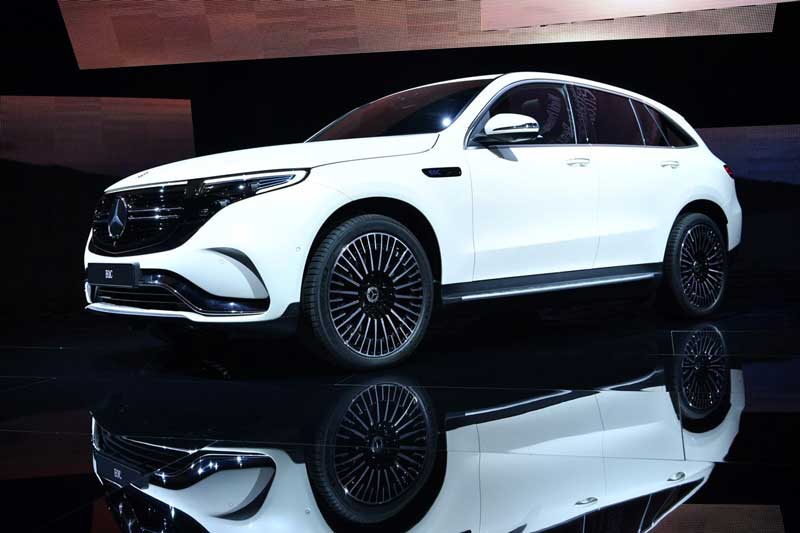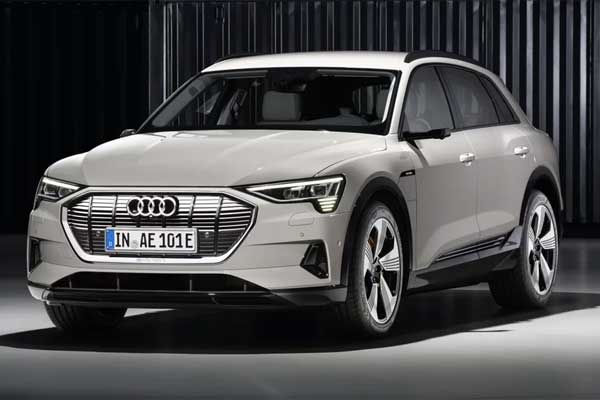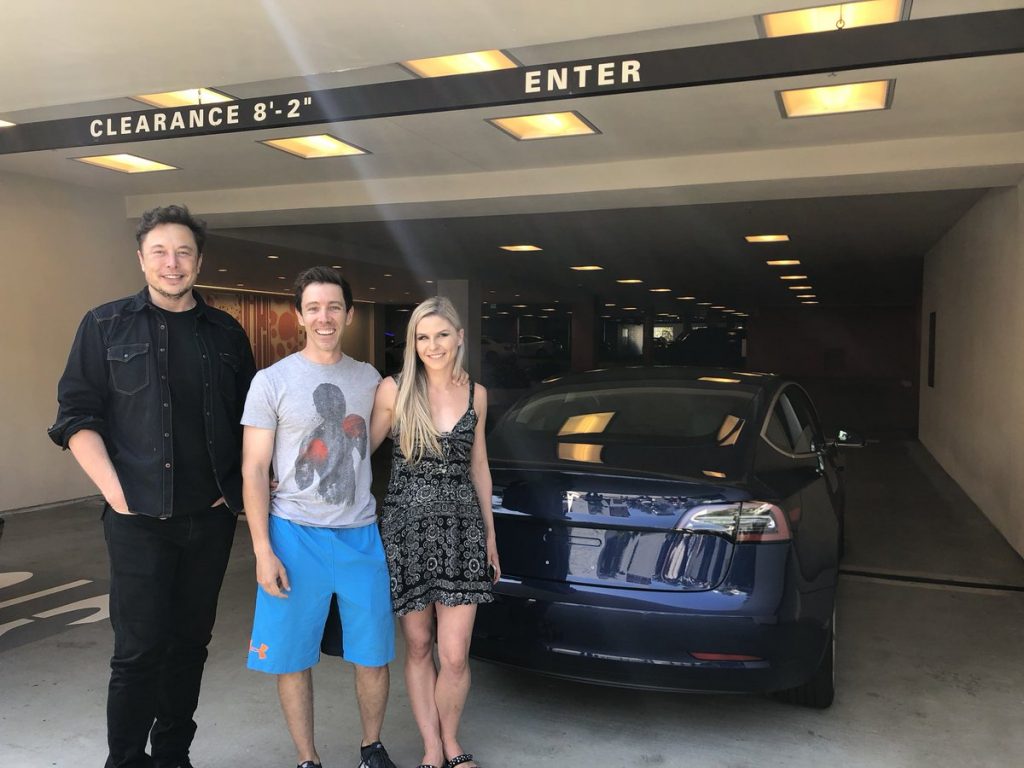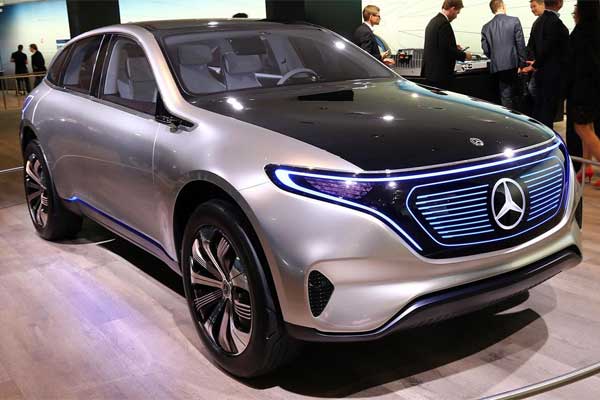The automotive industry is a critical sector that drives global economies.
Since the early days of Henry Ford, automotive vehicles have run on combustible engines propelling the fossil fuel industry to new heights. However, a new era is on the verge for vehicles as manufacturers adapt to the challenges of the 21st century.
General Motors CEO Manley Barra said the company plans to make the shift towards a zero-emissions fleet of vehicles. But they are not the first global automotive company to make such a bold announcement, which has set a precedent by which many companies are rushing towards electrifying their brands.
So why are these companies attempting to out-do each other in the EV rush?

The Mercedes-Benz EQC crossover. /Mikael Sjoberg/Bloomberg
1. The short answer is business … but the longer answer has to do with brand recognition and of course “climate change”.
Growing concerns over climate change is helping shape the automotive industry. A recent IPCC report suggested that if emissions are not kept to 1.5C by 2030, the damage will be irreversible.
The report comes nearly three years after the Paris Climate Accord aimed to keep temperatures within 2C of pre-industrial levels and limit it to 1.5C. In a warming world, extreme weather events are expected to increase.
Climate change has impacted recent extreme weather events including Hurricane Harvey, Florence, and the European heat waves have increased due to the adverse effects of a changing climate.
These extreme climatic events will severely negetively impact the global economies as highlighted by Nicholas Stern 2006 groundbreaking climate change economics report, and as recently reported by a damning US government report.
Insurance companies including Munich RE have noted that increased extreme weather events have amplified insurance costs, which has a direct effect on vehicle ownership.
All these and more are reasons why the automotive industry is now committed to going electric.
General Motors, BMW, Volvo, Ford are planning to go all in on Electric Vehicles (EVs). It’s expected that global car manufacturers will invest $90 billion in this transition.
Governments are also stepping in to regulate the industry, with Germany and Norway who have announced legislation that will require all new vehicles be electric by 2025.

The 2019 Audi e-tron, an all-electric crossover, will be able to travel up to 248 miles on its 95-kWh battery. /Audi
It’s now quite clear that both global governments and the environment are giving market signals to the global automotive industry to ax combustible engines, and ensure future success.
2. Improved technologies and declining costs are accelerating the race towards EVs. According to Bloomberg New Energy Finance (BNEF), battery packs have fallen dramatically in price from $1045/kWh in 2010 to an average cost now of $209/kWh.
By 2025, McKinsey forecast that battery prices will drop to $160/kWh by 2025, while BNEF expects a further price drop reaching $100/kWh in the same year.
Lithium-ion technology which allows for not only enhanced charge time but makes EVs a more attractive option for manufacturers would reach price parity with combustible engine vehicles by 2024.
As battery prices fall and the technology improves, this will open the door to more markets such as for electric buses, and semi trucks, as automotive companies see the benefits of diversifying electric fleets.
This would actually be good news for a company like BYD which specializes in e-buses, (recognized worldwide as part of major public transportation fleets in Shenzhen China, Santiago Chile, and in the United Kingdom).
Tesla had announced it would release two versions of its electric semi truck (475 or 800 km range), scheduled for release in 2019. Since its announcement, Tesla has received bookings from top companies including UPS, DHL, Walmart, Loblaws, Sysco, and Anheuser-Busch, according to Business Insider.
With autonomous vehicles expected to play a more significant role in automotive development (as seen with their integration in Tesla vehicles) going electric ensures this transition is smooth in the long run.
3. Consumer Preference Changing in favor of EVs. It’s no secret that more and more people are buying Teslas, and other car companies want in on the take. This rush to satisfy a growing market is pushing the automotive industry towards EVs.
Tesla’s vehicles have garnered praise from both consumers and critics alike, including the Model S winning the 2013 Motor Trend car of the year.
A major setback to a faster growth for the EV market is cost. Many customers still perceive EVs as being too expensive, and manufacturers are trying to solve this issue.
Take Tesla for example, in response to addressing these concerns and by taking advantage of falling battery prices; the company has released it’s Model 3 for a price of $35,000 which would appeal to a wider consumer demographic.
On its first day of bookings in April 2016, Tesla took in around 180,000 bookings at $1,000 reservation, showing keen interest from customers.

Elon Musk personally delivers a Tesla Model 3 to a reservation holder. /Devin Scott/Twitter
With Tesla leading the EV push, along with new competitors including Dyson entering the fray, consumers will have more options at play within the EV markets, which will force traditional automotive companies including General Motors, and Ford in continuing push towards EVs providing more customer choices.
Summing up
While concerns of climate change, improved technologies, and decreasing battery prices, along with more consumer options in the EV market are all positive signs of an “EV transition,” many challenges still remain.
Battery costs remain a concern despite a continues decrease year over year. BNEF transportation analyst Colin McKerracher said that for the real mass adoption of EV’s, further battery price declines will need to happen, while increases in battery materials may stall market momentum.
With the Trump Administration cutting back on fuel economy standards, and rolling back Obama era standards, there could be a risk of traditional automotive companies stalling the push towards electrification.
However, despite these concerns, it’s only a matter of time before the EV market takes over combustible engines market due to consumer choice, trendiness and market demand.













Comments